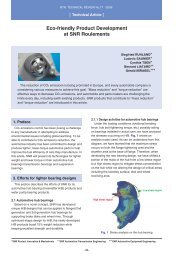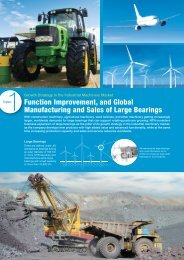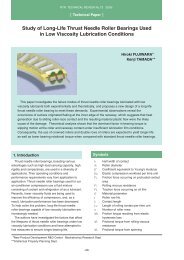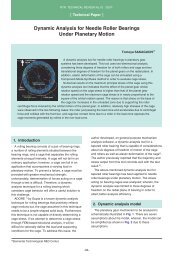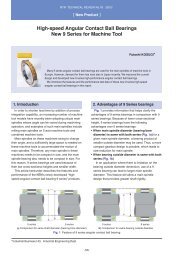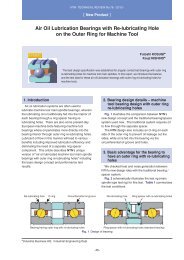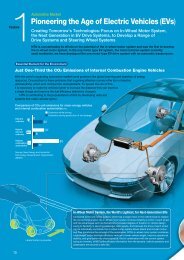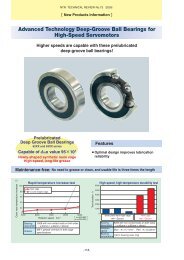Special Issue; Products for Industrial Machinery - NTN
Special Issue; Products for Industrial Machinery - NTN
Special Issue; Products for Industrial Machinery - NTN
Create successful ePaper yourself
Turn your PDF publications into a flip-book with our unique Google optimized e-Paper software.
Technical Trends in Bearings <strong>for</strong> Office Equipment<br />
can be seen in Fig. 6, EF-7 Grease boasts hightemperature<br />
life that is more than three times as long<br />
as that of EF-5 Grease. There<strong>for</strong>e, <strong>NTN</strong> will employ<br />
EF-7 Grease as a standard conductive grease <strong>for</strong><br />
fuser roller support bearings.<br />
Test bearing<br />
Resistance value k<br />
Table 4 Test condition of bearing resistance<br />
Running speed (min -1 )<br />
Radial load (N)<br />
Ambient temperature (˚C)<br />
Control resistance (k)<br />
40<br />
35<br />
30<br />
25<br />
20<br />
15<br />
10<br />
5<br />
Operating conditions<br />
0<br />
0 100 200 300 400 500 600 700<br />
Test duration h<br />
EF-5<br />
EF-7<br />
Fig. 5 Results of bearing resistance test<br />
Test conditions<br />
2TS3-SC05B98ZZ 25mm32mm7mm<br />
130<br />
220<br />
200 Room temperature<br />
300<br />
4.2 Bearing technologies <strong>for</strong> chemical attack<br />
resistance<br />
Many resin components (mainly those made of<br />
aromatic resins) are used in color copying machines<br />
and color LBPs. The bearings used in these machines<br />
are prefilled with grease as lubricant, and their outer<br />
faces are coated with rust-preventive oil. With<br />
particular combinations of oil and resin, cracking<br />
and/or crazing can occur on resin components.<br />
4.2.1 Mechanism of chemical attack<br />
Chemical attack (stress corrosion cracking) is a<br />
phenomenon where corrosion and static stress lead to<br />
cracking and embrittlement. Static stress is a stress<br />
occurring on an object when a given static load is<br />
applied to it. Corrosion occurs when compatibility<br />
between the resin and the solvent is high, as the<br />
solvent dissolves the resin or enters molecules in the<br />
resin and slackens its polymer chains and crystal<br />
structures, leading to the occurrence of cracking<br />
and/or crazing.<br />
4.2.2 Chemical attack evaluation<br />
As shown in Fig. 7, a resin test piece was bent by a<br />
particular amount, and the sample oil was applied to a<br />
face of the test piece where tensile stress was<br />
applied. The test piece was then left to stand under<br />
the test conditions summarized in Table 6.<br />
Table 5 Test condition of high temperature grease life<br />
Test bearing<br />
Test conditions<br />
2TS3-SC05B98ZZ 25mm32mm7mm<br />
Ambient temperature (˚C)<br />
200<br />
Running speed (min -1 )<br />
130<br />
Radial load (N)<br />
220<br />
1) Temperature increase on the bearing (+15°C)<br />
Grease life<br />
judgment criteria<br />
2) Torque increase on the motor (1.5 times<br />
higher than that at the beginning of the test)<br />
Table 6 Test condition of solvent crack<br />
Resin test piece (mm) 150193(length x width x thickness)<br />
Deflection ratio (%)<br />
5<br />
Standing temperature (˚C)<br />
70<br />
Standing time (h)<br />
72<br />
(Deflection ratio = deflection/distance between supporting points)<br />
Resin<br />
(test piece)<br />
EF-5<br />
EF-7<br />
0 100 200 300 400 500 600<br />
Test duration h<br />
Application of oil<br />
100mm<br />
(Distance between<br />
supporting points)<br />
Fig. 6 Results of high temperature grease life test<br />
Fig. 7 Test rig of solvent crack<br />
-65-




![[New Product] Unit Products for Office Equipment - NTN](https://img.yumpu.com/27154451/1/184x260/new-product-unit-products-for-office-equipment-ntn.jpg?quality=85)
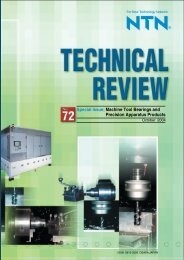
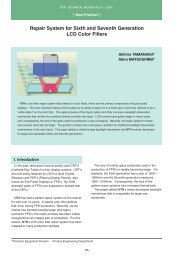
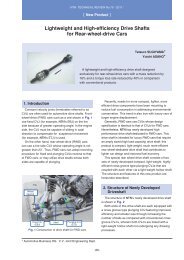
![[New Product] Development of Oil-impregnated Sintered ... - NTN](https://img.yumpu.com/27154427/1/184x260/new-product-development-of-oil-impregnated-sintered-ntn.jpg?quality=85)
